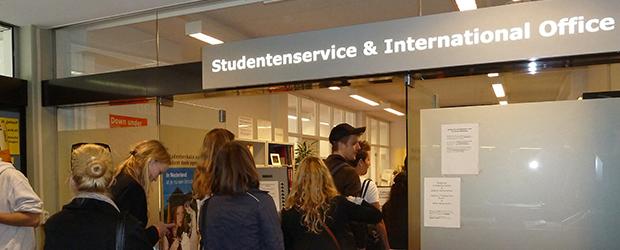To diminish the influx of foreigners
Minister of Education wants more control over internationalisation

On Tuesday evening, the Dutch Parliament held a debate about the number of international students in the country's universities. The big question was how to stay on top of the influx of students from abroad. The expressive growth in the number of foreign students makes for a series of bottlenecks, such as the one going on in the housing market, not to mention the increased work pressure on teachers and the accessibility of certain programmes to Dutch students. Each party has its own idea of how to deal with the situation.
The date of the debate didn't come in handy for Minister Dijkgraaf, as he is still working on a letter about the internationalisation of Dutch higher education. However, the minister affirmed that the debate did offer him an opportunity to lapidate his plans, which is why he put his writing on hold. The letter, which was supposed to see the light of day in February, is now scheduled to be published in March.
Nevertheless, he had a lot to say. The minister offered a peek into the dilemmas surrounding his letter. According to him, the biggest question is whether there should or should not be "a more centralised approach."
Emergency brakes
After all, one needs laws and agreements concerning universities' "control capacity" at the programme level — something everyone is on the same page about, in the minister's words. For example, Dijkgraaf would like to enable degree programmes with two tracks to establish a fixed number of spots for the foreign-language track only. This way, programmes would remain accessible to Dutch students, while allowing the institution to control the influx of foreign students at the same time. In addition, the minister finds that there should be "emergency brakes" for programmes that are suddenly overflowed by applications from countries outside of Europe.
But how to ensure that recruitment goes in the right direction? If universities are free to decide that a given programme is an exception, they will all go their own way, so nothing much would happen in the end. This warning was made by MP Peter Swint, from the Socialist Party.
Dijkgraaf acknowledged that possibility, which is why he's been considering a "centralised" approach. "Who is ultimately in charge of determining what is an exception, who is in control?," he asked the Members of Parliament. "It's understandable and legitimate that higher education institutions find themselves unique but we're talking about the sustainability of the system, not the sustainability of individual degree programmes or universities."
Pros and cons
There are both pros and cons at play right now, when it comes to internationalisation, stated Dijkgraaf. "To put it simply, our strategy should work towards expanding the pros as much as possible and reducing the cons as much as possible." He is striving towards a controlled influx of foreign students given the shortages in the labour market and the shrinking regions in the country. "In addition — and I should stress this is really important — we're striving for the preservation of Dutch as a language of education and science."
At that point, the MPs had already spoken their minds about internationalisation. Harm Beertema, from the far-right party PVV, reinforced his plea to make Bachelor's programmes Dutch-taught again, "with justifiable exceptions and noting that foreign students are still welcome." This position was echoed by the Socialist Party, the Christian Democratic Appeal, the Reformed Political Party, the ultra-conservative party Ja21, and the independent politician Pieter Omtzigt.
The centre-left party D66 stood at the other end of the spectrum. "It comes as no surprise that D66 sees internationalisation as an opportunity," declared the MP Jeanet van der Laan, a former football player. "Our academia is doing well. To put it in football terms, we're playing in the Champions League. I would really like to see us featured alongside the top international players. We're not an island."
However, D66 acknowledges some bottlenecks, such as the housing market. Van der Laan also mentioned the issue of funding for universities: "This is a really bad thing to say but international students mean more money. That's an uncomfortable stimulus, it shouldn't be about money."
Perverse incentives
Dijkgraaf took all opinions seriously and promised to delve deeper into the subject. "Many of you have said that it is really important to take a good look at the incentives and the financing, and I agree with that." However, the minister also warned that "every incentive begins with the best intentions and ends up becoming a perverse incentive."
Besides, there are multiple points of view. "Today, we're analysing financing through the lens of foreign students but maybe another day we'll analyse the same financing through the lens of shrinking regions or job opportunities," he said. "There are multiple points of view and they all have to come together."
As for changes in the law to support the policy, Dijkgraaf thinks that they may come, but that is going to take a while. He is considering using the draft bill titled Language and Accessibility, which he has recently tossed, as a stepping stone. The bill proposes to give programmes the opportunity to set up a fixed number of students for tracks that aren't Dutch taught. One of the problems is that said bill only foresees this as a temporary mechanism.
Foresight
So, the minister is still going to work on this puzzle for a while. He is going to unveil his vision on internationalisation in March and then follow with a big "foresight" ahead of the summer holidays. The latter will focus on financing matters. A "policy reaction" to said foresight is only expected in the autumn.